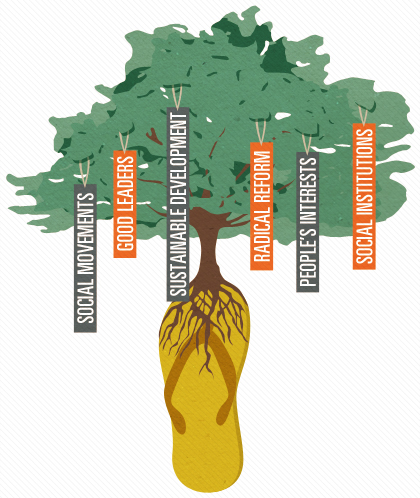Tuesday, December 9, 2014
good local governance
In1991, the Local Government Code was passed decentralizing the functions of delivering basic services from the central government to the provinces, the cities, municipalities and barangays. Three years later, in 1994, Galing Pook started recognizing best practices in local governance by local government units based on impact, citizen participation, innovation, replicability and sustainability. During that year, Naga City, under the leadership of Jesse Robredo, garnered its fi rst Galing Pook awards for outstanding local governance program. To date, Naga City has received a total of 14 Galing Pook awards (7 outstanding, 3 trailblazing and 4 special citations). It is now the most awarded LGU in the country from the Galing Pook Foundation. Taken all together, these awards give us ten lessons and guideposts, according to Jesse Robredo and Naga City, in practicing good local governance.
1. Improve Productivity. Naga City embarked on a program that
aimed to bring out the full potential of various departments and
offi ces of the entire city government. It had four main thrusts of (a)
providing suffi cient services to meet the requirements of the population;
(b) getting optimum outputs with minimum expenditures; (c)
producing quality results as desired and planned; and (d) making
services accessible and acceptable on the principle of “the greatest
good for the greatest number.”
2. Computerize. The city created an effective and effi cient management
system that streamlined business transaction processes,
provided a dependable database for more effective decision-making,
and made the city administration more responsive to its citizen’s
needs. The program components – management information system,
geographic information system and minimum basic needs database
– enabled the city government to establish a local database of
household population for every barangay. Support functions were
ensured in all line departments integrating revenue generation and
social development to deliver excellent services to the constituents.
3. Empower the People. The city government laid down a clear and
comprehensive framework that allows its constituents to take active
part in governance. Nagueños are able to voice their concerns
and suggestions to the City Hall and act on various issues – from
procurement to budgeting, to scuttling an initial plan of the local
government to allow a golf course. The program facilitated the engagement
of 193 non-government and people’s organizations with
the local government. It led to the institutionalization of the Naga
City People’s Council which counts NGOs, POs, cooperatives, barangays,
and everyone whose voices need to be heard, as members.
4. i-Govern. The city operationalized the “power of information”
and its value as a truly empowering tool when made accessible
for the people. Nagueños need only go online for their business
license, birth certifi cate, or even when they want to bid for government
procurements. People get what they need faster and more ef-
fi ciently, practically free from red tape and grease money. Through
i-Governance, Naga City also promotes good governance by
providing the people with information on city government policies,
programs, and operations.
5. Reinvent Institutions. In the reinvented school board of Naga
City, the structure ensures transparency, accountability, participation,
and predictability. The membership has been expanded
to include representatives from the academe, business, religious,
alumni associations, and non-government organizations. The NCSB
prepares the local education plan and budget with strong citizen
participation. It also made education offi cials accountable to the
public and identifi ed alternative ways of developing and fi nancing
the local education plan by mobilizing internal and external
resources.
6. Train the Youth. The City Youth Month Program of Naga engaged
the city’s top youth leaders to compete for the chance
to land in one of the 45 slots that would put them at the executive
and legislative positions, as well as in the non-government sector
as Naga City People’s Youth Council representatives that embody
Naga’s unique participatory governance model. While there are
limits to the authority extended to the City Youth Offi cials during
their term, they are given a wide leeway in running the affairs of
the city government. The project enhanced the involvement of the
youth in government affairs.
7. Be Prepared Always. Started in May 1991, Emergency Rescue
Naga addresses the urgent need for fast and reliable service in
times of emergency. ERN provides 24-hour quick response medical
and protective services to all Naga City residents in crisis situations.
The program mobilizes the combined resources of the city government
such as the police and fi re departments, the local association
of barangay councils, government-owned and private hospitals
and schools, radio stations, local amateur radio groups and private
medical volunteers.
8. Prioritize the Marginalized. The city launched the Kaantabay sa
Kauswagan or Partners in Development Program in 1989 to
address issues in a way that is fair for both the informal settlers and
landowners and that will discourage informal settling for good. The
program is guided by two key principles. First, the government will
not help the urban poor unless they actively participate in solving
their own problems. Informal settlers have to organize, settle their
own boundary disputes, negotiate with landowners, and make down
payments for their home lots with substantial support from the city
government together with its three partner NGOs. Second, is the
tripartite effort among the urban poor organizations, national and
local government agencies, and landowners in which the interests
and abilities of each party are taken into account.
9. Invest in Children. Evolving from the traditional day care services
of the DSWD and complemented by the Montessori system in
pre-school education, the comprehensive and innovative program
addresses the need for improved access and equity in quality education
for the young city residents. It was conceptualized by the city
government, in cooperation with the parents association, barangay
councils and NGOs. Since its inception in 1992, the NEED program
has successfully revolutionized the concept of the day care service
in Naga City forging a high level of synergy between program
managers and participants.
10. Together, We Can Do Better. The Metro Naga Development
Council, a partnership among the LGUs, pools together the
efforts and resources of 13 local government units, the private sector
and the national government agencies in Camarines Sur focusing
on projects and activities which address the immediate needs of the
community and lay the groundwork for the long-term growth in the
area. MNDC, with specifi c task forces, focuses on the maximization
of resources to reach more constituents widening the target coverage
with practically the same logistical capacity.
1. Improve Productivity. Naga City embarked on a program that
aimed to bring out the full potential of various departments and
offi ces of the entire city government. It had four main thrusts of (a)
providing suffi cient services to meet the requirements of the population;
(b) getting optimum outputs with minimum expenditures; (c)
producing quality results as desired and planned; and (d) making
services accessible and acceptable on the principle of “the greatest
good for the greatest number.”
2. Computerize. The city created an effective and effi cient management
system that streamlined business transaction processes,
provided a dependable database for more effective decision-making,
and made the city administration more responsive to its citizen’s
needs. The program components – management information system,
geographic information system and minimum basic needs database
– enabled the city government to establish a local database of
household population for every barangay. Support functions were
ensured in all line departments integrating revenue generation and
social development to deliver excellent services to the constituents.
3. Empower the People. The city government laid down a clear and
comprehensive framework that allows its constituents to take active
part in governance. Nagueños are able to voice their concerns
and suggestions to the City Hall and act on various issues – from
procurement to budgeting, to scuttling an initial plan of the local
government to allow a golf course. The program facilitated the engagement
of 193 non-government and people’s organizations with
the local government. It led to the institutionalization of the Naga
City People’s Council which counts NGOs, POs, cooperatives, barangays,
and everyone whose voices need to be heard, as members.
4. i-Govern. The city operationalized the “power of information”
and its value as a truly empowering tool when made accessible
for the people. Nagueños need only go online for their business
license, birth certifi cate, or even when they want to bid for government
procurements. People get what they need faster and more ef-
fi ciently, practically free from red tape and grease money. Through
i-Governance, Naga City also promotes good governance by
providing the people with information on city government policies,
programs, and operations.
5. Reinvent Institutions. In the reinvented school board of Naga
City, the structure ensures transparency, accountability, participation,
and predictability. The membership has been expanded
to include representatives from the academe, business, religious,
alumni associations, and non-government organizations. The NCSB
prepares the local education plan and budget with strong citizen
participation. It also made education offi cials accountable to the
public and identifi ed alternative ways of developing and fi nancing
the local education plan by mobilizing internal and external
resources.
6. Train the Youth. The City Youth Month Program of Naga engaged
the city’s top youth leaders to compete for the chance
to land in one of the 45 slots that would put them at the executive
and legislative positions, as well as in the non-government sector
as Naga City People’s Youth Council representatives that embody
Naga’s unique participatory governance model. While there are
limits to the authority extended to the City Youth Offi cials during
their term, they are given a wide leeway in running the affairs of
the city government. The project enhanced the involvement of the
youth in government affairs.
7. Be Prepared Always. Started in May 1991, Emergency Rescue
Naga addresses the urgent need for fast and reliable service in
times of emergency. ERN provides 24-hour quick response medical
and protective services to all Naga City residents in crisis situations.
The program mobilizes the combined resources of the city government
such as the police and fi re departments, the local association
of barangay councils, government-owned and private hospitals
and schools, radio stations, local amateur radio groups and private
medical volunteers.
8. Prioritize the Marginalized. The city launched the Kaantabay sa
Kauswagan or Partners in Development Program in 1989 to
address issues in a way that is fair for both the informal settlers and
landowners and that will discourage informal settling for good. The
program is guided by two key principles. First, the government will
not help the urban poor unless they actively participate in solving
their own problems. Informal settlers have to organize, settle their
own boundary disputes, negotiate with landowners, and make down
payments for their home lots with substantial support from the city
government together with its three partner NGOs. Second, is the
tripartite effort among the urban poor organizations, national and
local government agencies, and landowners in which the interests
and abilities of each party are taken into account.
9. Invest in Children. Evolving from the traditional day care services
of the DSWD and complemented by the Montessori system in
pre-school education, the comprehensive and innovative program
addresses the need for improved access and equity in quality education
for the young city residents. It was conceptualized by the city
government, in cooperation with the parents association, barangay
councils and NGOs. Since its inception in 1992, the NEED program
has successfully revolutionized the concept of the day care service
in Naga City forging a high level of synergy between program
managers and participants.
10. Together, We Can Do Better. The Metro Naga Development
Council, a partnership among the LGUs, pools together the
efforts and resources of 13 local government units, the private sector
and the national government agencies in Camarines Sur focusing
on projects and activities which address the immediate needs of the
community and lay the groundwork for the long-term growth in the
area. MNDC, with specifi c task forces, focuses on the maximization
of resources to reach more constituents widening the target coverage
with practically the same logistical capacity.
Making a difference
Jesse Robredo’s lessons for the Left
The Robredo case underscores one critical point for the Left: the new Left is out there. The current Left can either recognize this and do something about it, or once again be left out in the emerging politics of change.
Even in death, Local Government Secretary Jesse Robredo continued to make headlines. On the 40th day of his death, he still attracts attention.
Barely a week after he was brought to his final resting place, media reports began to circulate that Robredo’s subordinate, Department of Interior and Local Government (DILG) Undersecretary Rico Puno, along with several police officers, had attempted to enter his condominium unit in Quezon City. This was a day after his plane crashed in Masbate on August 18.
President Benigno Aquino III, however, dismissed the incident, telling reporters that he had actually ordered Puno to lock down Robredo’s offices. Nonetheless, the chief executive also admitted that Puno was not given any direct instruction to enter Robredo’s condo apartment.
There were also allegations that the real intent of Puno’s attempted entry into the Robredo unit was to retrieve sensitive documents regarding an ongoing investigation, linking him to two anomalous arms procurement deals for the Philippine National Police (PNP) amounting to P400 million.
Reform commitment
Of course, Puno’s possible involvement in any irregularity remains pure hearsay, at this point in time. What is certain, however, is that Robredo did order several investigations targeting high government officials, most of which are still in their initial stages.
These investigations, we believe, underscore Robredo’s commitment to rid the government of corruption and introduce far-reaching reforms in the country. Such dedication is clearly reflected in his oft-quoted remark reminding public servants that it is not enough that they be matino (ethical), but that they should also be mahusay(effective).
To a large extent, Robredo’s reformist mindset was inspired by the desire to serve the people and to uplift the lives of the poor.
The values he had embraced when he was still alive are, incidentally, also the same principles that the Left has been fighting for over half a century. Of course, such assertion may be surprising for some, especially since the Left (as political science professor Nathan Quimpo pointed out) would often “resort to nontraditional, even radical or revolutionary means” to gain power.
But just like Robredo, Left activists also “want change (and) favor more equality.” It is their shared sense of fairness and social responsibility that have prompted both Robredo and the Left to seek ways of empowering the poor and improve the lives of the economically marginalized.
This is also reflected in their common attempt to change the country’s political system, which is largely dominated by a few elite families, and is often characterized by patronage and violence.
One can even argue that the brand of leadership shown by Robredo fairly approximates the kind of government that the Left envisions – honest, responsive and accountable, with adequate avenues for people’s participation.
It was, for example, during Robredo’s term as Naga City mayor that the Empowerment Ordinance (which institutionalizes local government-civil society participation) came into effect.
Under the said directive, civil society groups and people’s organizations, through the Naga City People’s Council (NCPC), are encouraged to participate in the deliberations of the Sangguniang Panlungsod, and are even allowed to vote and propose legislation.
By creating this mechanism for LGU-CSO engagement and cooperation, the NCPC has now become a model for participatory governance, both here in the Philippines and abroad.
Tribute from the Left
This does not mean, however, that Robredo was a conscious Leftist, or that he deliberately chose specific policies that would advance the Left agenda – far from it. After all, Robredo was never part of the Leftist movement, and he was most probably unfamiliar with its internal ideological discourse.
But by witnessing the desperate condition of our people first hand, Robredo was compelled to adopt certain advocacies that were likely to be supported by the Left.
Activist-turned presidential appointee Joel Rocamora made this clear, saying that, “Jesse and many of us in this government shared (an) intense and passionate struggle for reform.” Such closeness and cooperation became even more apparent when Rocamora, in his farewell statement, called Robredo a “brother and comrade” because by “calling someone ‘comrade’ means you trust him with your life.”
These accomplishments were also not lost on fellow Leftist thinker Robert Francis Garcia who described the former Naga mayor as a man who “defied logic” and as an “enigma.” A long-time proponent of popular education, Garcia wrote that while “the rest of us just mostly mouthed the notion of people’s participation…you (Robredo) actually made people’s empowerment as real as bread.”
Unprecedented
But the accolade that Robredo received from the Left is nothing short of astounding.
For the past 4 decades, various Leftist factions have waged armed revolution, asserting that the Philippine state is a colonial by-product and an instrument of oppression that has to be completely obliterated. Animated by their long-term goal of forcibly seizing power, large sections of the Left began cultivating a vanguardist mindset, believing that they practically have a monopoly of sincerity and goodwill, and that they alone can decisively address the numerous social ills plaguing the country.
Hence, the praises that the Left had bestowed on Robredo (who is a non-militant and a government official, to boot) is extremely rare, if not totally unprecedented.

His death, however, offers critical points of reflection for the Left. First, there are non-Leftist leaders (like Robredo) who are genuinely championing the people’s interests, and people recognize the efforts they are making. The large crowd that went to Robredo’s wake, both in Naga and in Malacañang, is proof of that.
According to one prominent radical intellectual, the Left’s largest mobilizations are not demonstrations but funerals. But even the number of marchers who joined Popoy Lagman’s funeral procession from UP-Diliman to Marikina in 2001 would pale in comparison to the crowd of mourners that Robredo’s death generated weeks ago.
Second, change that makes a difference in the lives of people can now be achieved in countless places, in different arenas and in various fields. The brand of politics that the Left espouses is no longer their sole franchise.
Making a difference
In fact, it can be argued that while the Philippine state – by and large – is still desperately in need of bold, sweeping reforms, a growing number of reform-minded public servants has taken the extremely challenging task of working in government to initiate incremental changes that are substantive enough to make a difference in the lives of common people – as what Robredo achieved in Naga City.
There are also a lot of civil society initiatives, as well as work of local government units that offer promising results that, if sustained, can make a lot of difference in various spaces of politics and governance in the country.
These include Puerto Princesa’s community-based sustainable tourism (CBST) program, now an excellent model of sustainable development program that generates jobs while protecting the environment; and the Rice Production Program of San Miguel in Bohol, which has resulted in greater investor confidence and improved productivity through constructive engagement between government and citizens in performance-monitoring.
Changes are also occurring in the largely conservative House of Representatives, where progressive legislators are slowly gaining recognition, and where radical reform measures like the Reproductive Health bill and Freedom of Information bill, are now being debated.
Leadership
But the final and most important lesson for the Left is the importance of leadership. If we are to push for sweeping radical reforms, we need social movements and institutions; but good leaders are also equally important. And the reason why Robredo’s leadership is truly exemplary is because of his ability to win the trust and confidence of people.
This points to the need for the Left to work on leadership – not only in terms of offering new leaders, but in regaining the trust and confidence of our people. But the Left would also have to recognize that in today’s world, they can be everywhere, and that efforts must be made in finding these “new Leftists” to more effectively advance the alternatives they offer.
The Robredo case underscores one critical point for the Left: the new Left is out there. The current Left can either recognize this and do something about it, or once again be left out in the emerging politics of change in the country.
After all, Robredo is the New Left. The Left may just not know it yet.
8 things to remember as a leader

It’s been a year since the Philippines lost one of its most beloved—and effective—public officials in recent history. Jesse Robredo made a name for himself through his award-winning mayorship of Naga City (from 1988-1998 and then 2001-2010), and later as an acting Department of the Interior and Local Government (DILG) Secretary (2010 to 2012). He got the job done despite strong opposition from political enemies, people who pushed for his resignation as DILG secretary, then fell over themselves praising the man after his death was confirmed.
Like any other great man, Robredo doesn’t deserve mere reduction into a list of good qualities and memorable moments. Those who want to emulate his inclusive leadership style and focus on merit should study his life thoroughly. At the same time, we should maintain a list of “highlights” that will help future generations and other public officials understand why Robredo was a force for positive change. Highlights such as…

The popular city building simulation was also a favorite at Naga City Hall, said Robredo aide Francis Soler: “It helped [us] conceptualize urban planning. It helped them hone their skills at looking at the alternative use of resources.” Now SimCity won’t provide an ultra-accurate representation of a real-life city—more so in a country with a squatter problem like the Philippines—but it does help players understand that cities are a system. Small changes can lead to big results, both negative and positive. Can you imagine a city mayor asking his staff to play a video game? This is just one aspect of Robredo’s straightforward yet unique on governance.

This award, given way back in 2000, solidified Robredo’s prominence within local and international leadership circles. It’s worth looking at because it summarizes Robredo’s effectiveness in layman-friendly language. Here’s the money quote from Robredo’s 2000 Ramon Magsasay award citation:
Robredo began with a strike against patronage. He introduced a merit-based system of hiring and promotion and reorganized city employees on the basis of aptitude and competence. He then moved against local vice lords, ridding Naga of gambling and smut. Next, he relocated the bus and jeepney terminals outside the city center, ending gridlock and spurring new enterprises at the city’s edge.

Via philstar.com
In partnership with business, he revitalized Naga’s economy. Public revenues rose and by 1990 Naga was a first-class city again. Robredo’s constituents took heart and reelected him.
What Robredo did sounds so simple, so easy. But when you consider his activities within the context of Philippine politics, you’ll realize that he moved mountains.

Robredo came into power in 1988 because of his uncle Luis Villafuerte, who used Jesse as a pawn to wrest the Naga City mayorship from the Rocos. Yet by 1991 Villafuerte was a bitter political enemy of Robredo, as the older man realized that “utang ng loob” and family ties didn’t ensure ownership of Naga City and its young mayor.
At the same time, Robredo never let his public duties take him away from his family. This was no problem in Naga, a small city where people can go home for lunch. Yet nothing changed when Robredo became an acting DILG secretary, based in Manila with a full schedule that required traveling around the country. In fact, Jesse’s fatal flight was undertaken so that he could watch his daughter Jillian receive a sports award

For the uninitiated, “Epals” (from the root word “pumapapel” or “mapapel”) are politicians who love taking credit for a job they’re supposed to do. They spend public money putting up billboards featuring their names and faces instead of, you know, using the funds to improve their respective constituencies.
Robredo had enough of such activity as DILG secretary, reiterating President Noynoy’s push for an “epal-free” environment in a memorandum:
“The practice of putting up billboards or signages bearing the names, initials, and images of government officials and projects has been noticeably abused and misused by some public officials for their personal interests and has taken the credit away from the taxpayers who are the ones paying for such programs or projects through their tax payment.”

Gabriel Hidalgo Bordado Jr., who served as Vice-Mayor under Robredo, sent us this via Facebook message:
Jesse’s greatest legacy here in Naga City is putting the power back into the hands of the people. Right after the so-called People Power Revolt of l986, the fashionable catchphrase was “people empowerment”. Only Jesse Robredo, however, did seriously attempt to give flesh and substance to this amorphous catchphrase.He facilitated the passage of the landmark People Empowerment Ordinance which called for, among other things, the establishment and institutionalization of the Naga City People’s Council. He also backed up the passage of the i-Governance Ordinance to further expand the participation of the people in the development process and, at the same time, install the mechanisms and systems for transparency and accountability.

More from Mr. Bordado:
When Jesse became the Secretary of the Interior and Local Government, he elevated his Naga City initiatives on transparency and accountability to the national level by issuing a memorandum circular requiring all local government units and the DILG regional offices to fully disclose their financial transactions and operations.
As representative for Camarines Sur’s 3rd district, Leni Robredo (Jesse’s widow) filed the Full Disclosure Bill. The proposed law sought to require the same kind of transparency Robredo promoted as Naga City mayor, but on a national level.


Writing about the politicians pushing through with proposing constitutional changes (that would call for a Constituent Assembly, or a “Con-Ass”) despite overwhelming public opposition, Robredo was quite clear in his blog:
“…it is only the language of votes that they will listen to. No morality plays or shaming execises can return them to their senses. We need to campaign to their constituents that they should not be voted to office again. Otherwise they will continue conning us. We can begin with all the institutions and organizations which denounced HR 1109. The church, business and civil society groups must learn from the lessons of the past.
They must not only denounced [sic] “Con Ass”. They must also ask the members of their groups not to vote for the “Con Ass Congressmen” and likewise campaign against them. In denouncing “Con Ass”, I will tell everyone who cares to listen that we not should vote for the Congressmen who believes that they can simply get away with this again. When they seek our vote, offer us money and gifts, we do not need to refuse them. We will lull them into complacency. After conning us for a long time, it is now our turn to con them! Let us make them lose in the next elections.

A reason why Robredo was so against Con Ass was because he believed that the system in place already worked, even as that system worked against him. It was just a matter of effective implementation and active participation. That’s why, as he pushed for good governance, he also pushed for people to not only go out and vote, but vote wisely.
Hindi sa marahas na pamamagitan kung hindi sa kapangyarihan maituwid niyang gagawin— ang pagboto ng tama. Siyam na milyon sa 2010 ang may ganitong pagkakataon kung mabubuo ito. Mahigit beinte porsiyento ng pangkalahatan. Ang “RV Campaign” ay makikiisa sa lahat ng may parehong layunin na mabigyan ng tunay na saysay ang halalan. Hindi lamang hikayatin ang mamayan na mag-rehistro at bumoto.
Kung hindi suriin ang mga pagpipilian at magkumbinsi ng iba para magkaroon ng saysay ang kanyang kapangyarihan maging bahagi sa pagluklok ng pamunuan sa ating bansa. Maliban sa hamon ng 2010, ang isang layunin ng kampanya ay tumulong na palawakin at palakasin ang tinatawag na “reform constituency”. Ibig sabihin sa lokal at sa nasyonal, umaasa tayo na ito ang mga banhing ipupunla natin patungo sa makahulugan at pangmatagalang pagbabago sa ating bansa.Magrehisto at bumoto tayo!”
leadership lessons
7 leadership lessons from Jesse Robredo
The country has lost a leader and a public servant, but hopefully not the example he set as he played those roles
MANILA, Philippines – It's been a year since the death of Interior and Local Government Secretary Jesse Robredo. The country has lost a leader and a public servant, but hopefully not the example he set as he played those roles. Here are leadership lessons we learned from him:

1. A good leader is a good listener.
Jesse Robredo understood the importance of talking to his constituents to serve them better. Good leaders need to listen and understand where others are coming from in order to arrive at better solutions. We should listen to what everyone has to say so we can address their needs, answer their questions, and ask them as well.
"My husband always used to tell me that a public servant should know how to heed the call of the people even if it's against his wishes," said his wife, now Camarines Sur Rep Leni Robredo.

2. Transparency + Integrity + Fairness = Trust
Jesse believed that you earn respect if you stand by your principles. If people see that you are transparent, fair, and firm, others won't ask you to compromise your stand.
A good leader has his motivations and intentions in order. Service must come first so your followers trust that you only have in mind their interests – not fame, recognition, or personal gain.

3. Be amazing at what you do.
It isn't enough that you have good intentions. You have to be good at what you do. A good heart as well as knowledge and skills are necessary to be an effective leader. Promises are far too easy to make, but you also have to have the know-how to deliver.

4. Everyone has a part to play in finding a solution.
Good leaders know that no one can achieve progress alone. The best way to get others involved? Give them a stake in the solution. Show them that they have a role to play and that no role is too small. And then they will be more cooperative, even more proactive, in finding solutions.
Take your cue from Jesse.
"I think his biggest contribution to Naga was that every Nagueño was proud again that they are from Naga. At that point, everyone became very cooperative with everything happening in the city. They regard themselves not as subjects but as stakehodlers," says Leni.

5. Dream big, but stay realistic.
Oftentimes we have our eyes set on lofty goals that we fail to consider its practicality. A good leader knows how to manage his expectations. He dreams big and aims high, but he is also aware of his strengths and weaknesses. Know the resources you have and what you can achieve given with what you have.

6. No position is too high, nor task too low
Aika Robredo once said her father is known to do even menial tasks, like shoveling mud after floods. For Jesse there was no such thing as a job too small for him to do. During disasters, he was the first on the field and the last to leave. A good leader doesn't just sit in his office giving orders when he himself doesn't know how much work each task involves. The intention to serve comes before titles and position.

7. Embrace innovation.
Learning how to adapt is a necessary skill to be an effective leader. Take time to learn how new things work and how you can make them work for you. Know how new technology, for example, affects how people behave and how they use it. More government offices, for example, are exploring social media platforms and applications to better communicate with the people.
pearls of wisdom
Here are some pearls of wisdom from Jesse M. Robredo:
"Ang Lider ay Dapat Matino at Mahusay"
Jess often preached that it is not enough for a leader to be "good" (i.e. does not steal, abuse authority, compassionate, etc.). A leader must also be "competent" (e.g.intelligent, highly-educated, innovative/creative, etc.). To him, honesty, compassion, good intentions, fear of God, etc. are well and good, but if the leader is educationally unprepared, lacks the ability to understand multi-faceted issues, and unable to devise novel solutions to complex problems, that person would be rendering a disservice to the people and would not be an effective leader.
People often think that Robredo was referring to himself when he said that a leader must be "matino at mahusay." This is because, to many, Jesse epitomized the two leadership qualities. But to my mind, I believe that he was referring not to himself but to his fellow Bicolano "kababanwa" - Senator Raul Roco - as the epitome of the "matino at mahusay na lider." This is because the first time I heard Jess utter his now famous line was in 2004 during a rally in Naga City. Jess was then campaigning for Roco for president, and he used the "matino at mahusay" tagline to convince people to vote for Roco. Those who knew would attest to his humility and simplicity, and Jess is not the type to even imply that he is the "matino at mahusay na leader" referred to in his speeches.
Through the years, Jess used this "matino at mahusay" slogan in his speeches to promote his good governance agenda. Furthermore, when he became DILG secretary in 2010, he instituted the "Seal of Good Housekeeping" program to motivate LGUs and inspire local chief executives to be "matino at mahusay." The award is given to LGUs who have instituted all the accountability, transparency and governance reform measures designed by DILG. Today, Robredo's "Seal of Good Housekeeping Challenge" has been widely accepted by LGUs.
"Walang Malaki o Maliit"
One of Jesse's most favorite catchphrases is "walang malaki o maliit sa akin, lahat pare-pareho." I believe that this deceptively innocuous statement is the very essence of Robredo's management style and political philosophy.
As a management philosophy. Jess truly believed that each task, no matter how big or small, is worthy of his best efforts. And he expected his people to apply themselves to each task with equal zeal and dedication. Of course, this management concept is not really original - as a management engineering graduate, Robredo probably picked it up from the Japanese "Kaizen" management philosophy. "Kaizen," which means "the way of continuous improvement," was adopted by Japanto propel their war-ravaged economy into becoming the world's second largestnext only to the United States. The Japanese were able to achieve this because their "quest for never-ending improvement" enabled them to equal, and eventually surpass, the Americans. In time, Japan succeeded in manufacturing cheap but superior qualitycars, excellent value-for-money electronic products and their industry became more efficient than the U.S. And the Japanese were able to achieve this because the lowliest factory worker in Japan rendered the same "best effort" as the top-ranked executives in their corporation, in line with the "Kaizen" management philosophy.
Another aspect of "Kaizen" is the belief that each part of the process and/or each individual members of the team are equally important. It is said that top level executives of Japan's Toyota car company are tasked to clean the corporate bathrooms once a year, in order to keep them "grounded" and to remind them of the importance of each person in the corporation. This is probably the reason why Jess did not think it was beneath him to shovel dirt and clear debris after a typhoon, to sweep the street in front of his home, or to come to a PTA meeting in slippers. As such, Robredo never got tired of exhorting his own people in Naga City and the DILG to take pride in their work and give it all they've got, regardless of how menial the task or low their rank.
As a political philosophy. People are often pleasantly surprised with the "VIP treatment" they get from Jess. Just the other day I watched on TV an emotional urban poor leader who paid a tribute during Robredo's state funeral in Malacañang, saying that "Secretary Jess did not see us as trash or consideredus as an eyesore; he treated us with all sincerity and he was alwaysaccessible to us." Likewise, one can read numerous anecdotes online or in print media about how Robredo would return their calls or entertain their requests, no matter how small. All the stories seem to say one thing: Jesse Robredo was a person who is "medaling lapitan at medaling hanapin."
I have heard Jess often say "walang malaki o maliit sa akin, lahat pare-pareho" which to him meant that he not only treated all his job assignments as worthy of his best efforts but alsothat he saw people, no matter their station in life, equally. Thus, he treated a text message or a phone call of an ordinary citizen, although perhaps not with the same urgency but with the same importance, as a phone call from the President of the country.
In many ways, Robredo's "walang maliit o malaki" philosophy goes against the grain of our country's "split-level democracy" (which I derived from "split-level Christianity," a term originally coined by the Jesuit priest Fr. Jaime Bulatao). We can see its manifestations everywhere: in airports there are VIP rooms reserved for dignitaries; during festivals there are separate entrances and seats reserved for "important" guests; etc. etc. And we Filipinos really do not see anything wrong with this. In fact, we tend to believe that it is the natural order of thingsfor our "political betters" to be exempted from lining up like the rest of us, and that they are entitled to certain special privileges because of their status in society. Last Friday I paid my last respects to Jess in Malacañang and I saw this "split-level" mentality at work: hundreds of ordinary Filipinos lining up at Gate 7 while "VIPs" entered the Palace through a separate gate reservedexclusively for them. I also saw that, after paying their last respects, the teeming masa were given refreshment (contained in paper packages) while the high-ranking Filipinos and their staff were invited to partake in a buffet dinner inside one of the Malacañang rooms.
In many ways, Robredo's notion that the masa (the "maliit") and elite (the "malaki") are entitled to the same kind of treatment or service from government officials is"subversive" and even "dangerous."For what would happen if the people lining up in Malacañang suddenly felt entitled to pass through the "special gate" reserved for VIPs? Or what if they felt entitled to partake in the sumptuous buffet reserved for Cabinet members and their staff? Which brings me to the third and final gospel of Jesse Robredo.
"Good Government Cannot Be Achieved Without People Empowerment"
I have seen Robredo "in action" when he was still mayor of Naga City. I can attest that the stories about him walking around in his city wearing just shorts and slippers are all true, and he is the only mayor I know who rode a mountain bike to his meetings. I had on several occasions had the chance towalkwith him around Naga City and it was quite obvious that the Nagueños adored him - sidewalk vendors would greet him, women would approach and hug him, and neighborhood tambays would swap jokes with him.
Of course, this sort of adulation is not really unique and I know of many other local politicians who merit the same kind of "crowd reaction" each time they visit the public market, shop at the mall or simply walk the streets of their territory. But what makes Jesse unique is the fact that (he said this to me) in allhisyears as mayor he never handed out any cash to a "supplicator." Hetold me that when he was elected mayor one of the first "contract" he had with the people is that they could not expect to get "KBL" money out of him. Butin exchange he promised not to steal and vowed to render them "true" public service.During his first term local media practitioners derisively called him a "boksingero" but in time the people grew to accept and eventually admire Robredo's "idiosyncrasies."
In his 19 years as mayor of Robredo did not engage in "tokenism" but tackled problems head on. He solved Naga City's traffic problem, relocated all squatters (especially those living in dangerous zones) and provided them with decent housing, and publishedthe city'sannual budget in the spirit of transparency. If an indigent person approaches him (usually with a sob story), Jess would usually refer him to the City DSWD or to the concerned city department head for immediate action. This system was instituted he explained so that people will not think that it was his personal money that was used to help them. He also instituted a People's Congress comprised of urban poor leaders, women's groups, NGOs, etc. to participate in City Council discussions and help City Hall towards coming up with viable solutions to the city's problems. Much has already been written about Jesse's efforts to promote transparency, accountability, good governance and people empowerment, and I do not wish to belabor them here. But let me add just one more anecdote to illustrate how "empowered" the people of Naga City really are.
Jess often reminded people that "it is not enough for a leader to be good; more importantly, it is the people and the system that must force the leader to be good."In 1998 Jess reached his mandatory 3-term limit as mayor. As to be expected, people anticipated him to field his wife Atty. Leni Gerona Robredo, a successful career woman in her own right who equally possesses the "matino at mahusay" qualities needed to become a good local chief executive. But thecitizenry of Naga City felt that having his wife succeed him would be contrary to all that he stood for. The empowered Nagueños were not afraid to articulate their stand and in the end Jess heeded the people's voice. But this did not mean that the Nagueños no longer loved him. In fact, Jesse'shandpicked candidates swept the pollsthat year, winning all positions from mayor to vice mayordown to the ten (10) council seats.
In a speech before the graduating students of Ateneo de Manila University Jesse Robredo said: "Our political history has shown that we have put the burden of running this country to our 'best' people for too long. And yet the gap between the rich and the poor has grown wider. For this country to succeed, we need to make heroes out of the ordinary people. We need to make heroes of ourselves."
Dios Mabalos Jess!
Subscribe to:
Posts (Atom)





